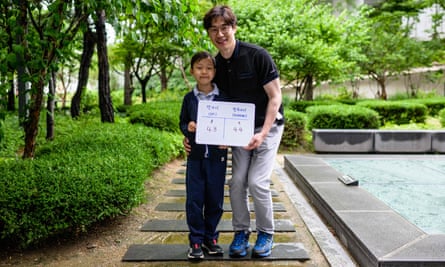[ad_1]
All South Koreans have instantly become a year or two younger, as the country ditched its traditional – and increasingly unpopular – system for counting someone’s age and replaced it with the internationally accepted method.
Under the previous system, the country’s citizens are deemed to be a year old when they are born, and a year is added every 1 January. The unusual custom meant that a baby born on New Year’s Eve would become two years old as soon as the clock strikes midnight.
But under the revisions introduced on Wednesday, ages will be calculated in the same way as the rest of the world in most administrative and civil matters, including contracts and other official documents, the Korea Times said.
The national assembly, which approved the change in December, said it would “resolve the social confusion caused by the mixed use of age calculations and the resulting side effects”.
While the global standard has applied to medical and legal documents since the 1960s, other official forms have continued to use the traditional method.
The system has attracted criticism in recent years from politicians who argue that it causes confusion and makes South Korea, a global technological and cultural power, appear out of step with the rest of the world.

The president, Yoon Suk Yeol, said the existing arrangements were a drain on the country’s resources. In a poll last year, more than 70% of respondents said they agreed with the change.
“We expect legal disputes, complaints and social confusion that have been caused over how to calculate ages will be greatly reduced,” Lee Wan-kyu, the minister of government legislation, told reporters.
“It feels good,” Lee in Seoul told the AFP news agency. “For people like me, who were supposed to turn 60 next year, it makes you feel like you’re still young.”
“It’s confusing when a foreigner asks me how old I am as I know they mean international age, so I have to do some calculations,” office worker Hong Suk-min told AFP.
While some people are expected to continue using the traditional method in informal settings, 86% of South Koreans said they would adopt the international system in their everyday lives when the new law takes effect, according to a government survey conducted in September 2022.
But the change will not suddenly deprive people of the right to legally buy cigarettes or alcohol, or change the year in which they enter compulsory education or become eligible for up to 21 months of national service – a legal requirement for all able-bodied men.
A third system that governs those areas of life – in which a person’s age is calculated from zero at birth and a year is added on New Year’s Day – will remain in place for the time being, according to officials.
“The government decided to retain those exceptions even after the revisions go into effect, as it is easier to manage them on a yearly basis,” Lee said.
The origins of the traditional age-counting method are unclear. One theory is that turning one-year-old at birth takes into account time spent in the womb – with nine months rounded up to 12. Others link it to an ancient Asian numerical system that did not have the concept of zero.
With Agence France-Presse
[ad_2]
Source link
